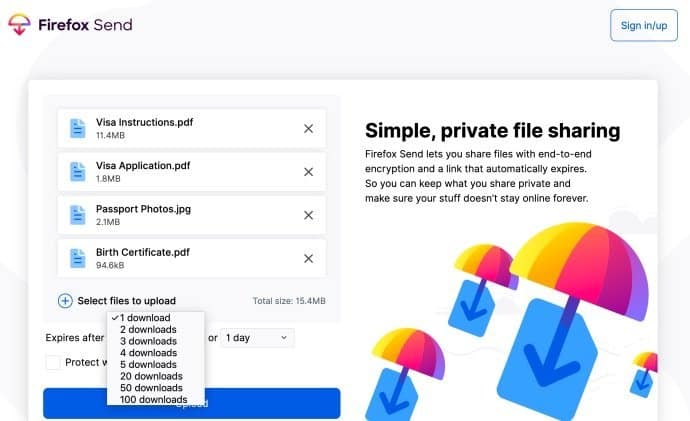Firefox Send, the free encrypted file transfer service, was officially launched today. In August 2017 Mozilla started the free service, but at that time it was still an experimental version. However, as of today, the service that encrypts files is available to everyone.
Mozilla started its Firefox Send trial by sending up to 1 gigabyte of files. Today, this limit continues to apply to anyone who uses the service without logging on. Account creators can share files of up to 2.5 gigabytes.
Large files
Firefox Send offers an alternative to e-mails, in which large files are problematic. But it is also an alternative to cloud storage services such as Google Drive and Dropbox. Sometimes it can be a hassle to upload files to those services, especially if you only have to share one file with someone.
To use the service, all you have to do is surf to the Firefox Send website. There you can easily upload a file. Then you can also set an expiration date. From that moment on, the file is no longer available for download. It is also possible to protect the files with a password, before you share them.
https://www.youtube.com/watch?v=eRHpEn2eHJA
Firefox Send then gives you a weblink, which you can send to the receiver. The recipient only has to click on that link and can then easily download the file. The recipient does not need to create an account for this. Mozilla states that the new tool is also capable of sending sensitive documents that you would normally prefer not to share. Think of documents that contain the necessary financial information.
At the same time, experts always warn against looking out when using a service to share sensitive documents. Mozilla does have good security in place for its documents and therefore seems to be reasonably suitable for sharing sensitive documents. The service is available on send.firefox.com from today and will be available as an Android app later this week.
This news article was automatically translated from Dutch to give Techzine.eu a head start. All news articles after September 1, 2019 are written in native English and NOT translated. All our background stories are written in native English as well. For more information read our launch article.